|
|
|
Sort Order |
|
|
|
Items / Page
|
|
|
|
|
|
|
| Srl | Item |
| 1 |
ID:
180190
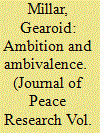

|
|
|
|
|
| Summary/Abstract |
For 50 years positive peace has served as an aspirational goal for many scholars and practitioners of peace. However, much recent scholarly literature evidences a substantial ambivalence toward this ambition, suggesting that prominent theories, policies and practices in the field have failed to support positive peace. This article argues that a key reason for this shortcoming is the field’s failure to respond adequately to the evolving character of conflict (latent and overt) related to technological, legal and economic changes associated with the consolidation of globalization over this period. This consolidation has served to shrink the distances between previously remote actors, to expand exponentially the influence of many institutions, norms, practices and projects as they penetrate new societies, to concentrate power into the hands of ever fewer actors, and to reify instead of deconstruct endemic inequality and marginalization within states, between states, and across the globe. The failure of the field to respond robustly to these changes also prompts concerns about its ability to face sweeping challenges soon to come related to technological innovation, climate change, demographic shifts, labour automation and the search for new governance models. This article, therefore, reaffirms the aspirational goals of peace and conflict studies by building on Lederach’s earlier Peacebuilding Triangle to propose a Trans-Scalar Peace System which would recognize the need for coherent and supplementary policies and actions across scales (global, regional, international, nation and local) and utilize a backward-mapping approach to promote a parity of esteem for actors, institutions and decisions at each scale which would, at the same time, privilege the voice of those with the most pertinent knowledge, experience and capacity for action in support of any given policy or practice. Such an approach would honour the lessons of the ‘local turn’ while developing a global trans-scalar peace system.
|
|
|
|
|
|
|
|
|
|
|
|
|
|
|
|
| 2 |
ID:
124347
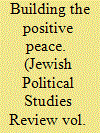

|
|
|
|
|
| Summary/Abstract |
It is generally accepted that the peace process, launched in 1993, went off the tracks and failed to meet the expectations of the interested parties: the state of Israel, the Palestinian Authority, and the international community. The international discourse plays down the historical depth of the dispute and everything which pertains directly to the Jewish religious, national, and cultural heritage that dates back more than three millennia in the Land of Israel. Also absent from the international discourse is an awareness of the rich academic and theoretical foundation of knowledge with regard to peacemaking. Concepts such as the positive peace, reconciliation, "ripeness," "stable peace" or "hurting mutual stalemate" have not been integrated into the discourse.
|
|
|
|
|
|
|
|
|
|
|
|
|
|
|
|
| 3 |
ID:
124348


|
|
|
|
|
| Publication |
2012.
|
| Summary/Abstract |
It is generally accepted that the peace process, launched in 1993, went off the tracks and failed to meet the expectations of the interested parties: the state of Israel, the Palestinian Authority, and the international community. The international discourse plays down the historical depth of the dispute and everything which pertains directly to the Jewish religious, national, and cultural heritage that dates back more than three millennia in the Land of Israel. Also absent from the international discourse is an awareness of the rich academic and theoretical foundation of knowledge with regard to peacemaking. Concepts such as the positive peace, reconciliation, "ripeness," "stable peace" or "hurting mutual stalemate" have not been integrated into the discourse.
|
|
|
|
|
|
|
|
|
|
|
|
|
|
|
|
| 4 |
ID:
183253
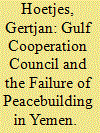

|
|
|
|
|
| Summary/Abstract |
Driven by increasing self-confidence and encouraged by Western states, Gulf Cooperation Council (GCC) states have gained a prominent role in multilateral efforts to foster peacebuilding in Yemen since the country experienced increased conflict from 2004 onwards. Based on the “negative and positive peace framework” proposed by Johan Galtung, it is possible to argue that the lack of focus of the GCC on fostering “positive peace” and disagreements between the Gulf monarchies heightened by hyper-nationalist tendencies inhibit the ability of this sub-regional organisation to facilitate peacebuilding in Yemen.
|
|
|
|
|
|
|
|
|
|
|
|
|
|
|
|
| 5 |
ID:
099751
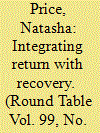

|
|
|
|
|
| Publication |
2010.
|
| Summary/Abstract |
Following the defeat of the Liberation Tigers of Tamil Eelam (LTTE) on 18 May 2009, Sri Lanka has recently entered a new era of negative peace. For the huge number of displaced persons, predominately of Tamil origin, who are currently trapped in camps in the North, the beneficial effects of peace remain unseen. This paper explores the links between resolving internal displacement and the transition to a positive peace. Under the 2002 Ceasefire Agreement, both the government and the LTTE failed to integrate return with recovery, undermining the wider peacebuilding process and contributing to further violence. In the context of military victory, the paper argues for an integrated approach to return and recovery, which will foster a new social contract between the government and internally displaced persons, utilising the return process in the transition to positive peace
|
|
|
|
|
|
|
|
|
|
|
|
|
|
|
|
| 6 |
ID:
152810


|
|
|
|
|
| Summary/Abstract |
The 2016 Presidential Theme for the International Studies Association’s Annual Conference was “Exploring Peace.” This Presidential Special Issue presents some of the innovative ways that scholars are “exploring peace” as more than just the absence of war. In this Introduction, we outline the central ideas behind the theme and show how the research in this Special Issue represents a new way of conceptualizing and studying peace. By expanding the definition of peace beyond the absence of war, the articles in this Issue provide insights into the ways that people do and do not experience peace in their quotidian lives. The works also illustrate how a broader conceptualization of peace can contribute to both IR scholarship and practice.
|
|
|
|
|
|
|
|
|
|
|
|
|
|
|
|
| 7 |
ID:
187399


|
|
|
|
|
| Summary/Abstract |
Southeast Asia has gone through a remarkable transformation in recent decades and seen peaceful change since the end of the Cold War era despite great power interference and rivalry and ongoing territorial disputes including the South China Sea conflict. The region has transformed its image from the so-called Balkans of the East in the 1960s and 1970s to an economically competitive and peaceful region today. Despite these accomplishments, the record of the Association of Southeast Asian Nations (ASEAN) in maintaining regional peace and security has also been seriously challenged, particularly at the domestic and transnational level. The paper argues that the Southeast Asian experience of peaceful change calls for a different framework of analysis that goes beyond the traditional International Relations theories which do not provide a compelling answer to whether regional peace has prevailed. It reviews ASEAN’s approaches to managing peace and security in Southeast Asia and brings close attention to domestic and international dynamics. The paper claims that the Southeast Asian states’ approach to positive peace, reflected in the notion of comprehensive security and the building of national and regional resilience, is instructive in understanding peaceful transformations in the region.
|
|
|
|
|
|
|
|
|
|
|
|
|
|
|
|
| 8 |
ID:
128863
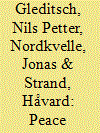

|
|
|
|
|
| Publication |
2014.
|
| Summary/Abstract |
The concept of peace has been under discussion in peace research from its start over 50 years ago. This article reviews the debate on broader and narrower conceptions of peace and investigates empirical patterns in the first 49 volumes of Journal of Peace Research, with some comparisons with Journal of Conflict Resolution. Negative peace, in the sense of reducing war, was the main focus in peace research from the inception. But positive peace, in the sense of cooperation or integration, has also always been on the peace research agenda, as reflected in the contents of both journals. Over time, a larger share of the articles in JPR has 'violence' or related terms in the title, while the incidence of the word 'peace' is fairly stable. Furthermore, articles on peace generally have fewer citations than those with violence-related terms. A broad concept of peace, as encouraged by the definition of positive peace as the reversal of structural violence, was popular in peace research for a decade or so, but has largely evaporated. To some extent, peace research has returned to its original agenda, although the main attention has shifted from interstate war to civil war and to some extent to one-sided and non-state violence. Articles dealing with patterns of cooperation, the traditional meaning of positive peace, now tend to address the liberal agenda and ask how they can foster a reduced probability of violence. Despite the 'gender gap', the increasing share of female authors in the journal appears to have had little influence on these developments although it may well have had other effects.
|
|
|
|
|
|
|
|
|
|
|
|
|
|
|
|
| 9 |
ID:
159588
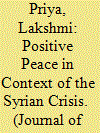

|
|
|
| 10 |
ID:
171770
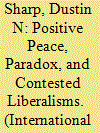

|
|
|
|
|
| Summary/Abstract |
This essay revisits Johan Galtung's early articulation of the concept of “positive peace” in order to re-surface its fundamental radicalism, together with some of its inherent tensions, paradoxes, and politics. It then explores the linkages and contested relationship between the concept of positive peace and the prevailing peacebuilding paradigm of our day: liberal peacebuilding. I argue that our understanding of debates about both positive peace and liberal peacebuilding can be clarified when viewed through the lens of contested liberalisms and conflicting liberal values. Such debates often appear to reflect more of a political and ideological debate within the larger liberal tradition itself and between competing liberal values than some kind of choice between liberal, illiberal, or “postliberal” peacebuilding. Advancing peace theory and praxis at this stage would benefit from an increasing willingness to more openly confront some of these choices and a greater degree of transparency about our liberal commitments, including in the hard, “real world” cases where tensions seem irreconcilable.
|
|
|
|
|
|
|
|
|
|
|
|
|
|
|
|
|
|
|
|
|